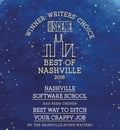In the latest episode of Stories from the Hackery, we catch up with Steve Brownlee, Nashville Software School’s lead full-stack software development instructor, for a behind-the-scenes look at how he rebuilt an application we used for pre-work that was discontinued several years ago using an open-source agentic AI tool. The result? A working prototype that would’ve taken much longer to code by hand—and a glimpse at how AI is reshaping software development.
From Idea to Implementation
Steve had been exploring agentic AI when he heard about an open-source tool called Roo Code. Curious to see what it could do, he decided to recreate an application NSS had previously used on Replit until it was discontinued. The application guides incoming students through JavaScript basics with hands-on exercises and instant feedback. With a clear vision of the end product and all the original content on hand, it was the perfect test case to see how well agentic AI could perform.
His first prompt was intentionally vague:
“I want to build a browser-based application where there is a series of chapters and sections as part of a navigation bar on the left, and then the rest of the screen should be split into two. On the left hand side, there should be content that we will write that the learner will read through, and at the bottom there will be an exercise for them to work on a description of it. Then on the right hand side, there should be a built in code editor where they can actually type the code. And then beneath that, there should be a button to run tests. When they click it, they will be given feedback about what code they got right, and what code they got wrong. That was pretty much all my prompt was.”
The AI took it from there, delivering a functional first version that Steve says “blew me away.”
“It built exactly what I asked it to build. It was a simplistic version of it, but it worked right out of the box. I was not expecting that at all… it pleasantly surprised me, and honestly, it kind of terrified me a little bit.” —Steve Brownlee
Building With (and Around) AI
Steve walked us through the iterative process of improving and customizing the application. Steve talked through changes with Roo Code to make the application better, such as patterns that would give him maximum flexibility in the future. But there was one thing it truly struggled with—CSS. “There were some parts where it had some layout and some rules just flat out wrong, and it could not fix it no matter how I prompted it, and I had to go manually make the changes myself.”
He also added new features, including a console output preview, a “Show Solution” button that appears after multiple failed attempts, and a reset option. The final result feels tailor-made for NSS students—and it was built in just a few weeks.
Who Benefits Most from agentic AI?
One of the more thought-provoking parts of the episode was Steve’s take on how agentic AI changes the developer experience. While these tools can boost productivity for developers at any level, he believes the biggest gains come when senior engineers are behind the wheel.
“The scale and complexity of what an AI can do [is tied to] the capabilities of the developer using it… juniors basically just accept [the output] as long as it works. Seniors have that holistic view of what impact does this code have on the entire system, and are able to scan it quickly and see if it matches what their expectation is.”
What This Means for Learning
As NSS prepares to roll out the new version of the pre-work platform, Steve is already thinking ahead: how will we train the next generation of developers to work alongside AI, not be replaced by it? That means emphasizing problem-solving, system-level thinking, and communication—skills that matter even more when your teammate is a coding agent.
“Software developers aren’t paid to write code. We’re paid to solve problems and build high-quality, resilient, maintainable systems.”
Tune in to the full episode for a walkthrough of Roo Code in action, reflections on AI’s role in professional growth, and why prompt engineering is still a core skill.
🎧 Watch on YouTube | Listen on SoundCloud or wherever you get your podcasts
Show Notes:
00:00 Intro: Meet Steve Brownlee
01:16 Case Study: Building an Application with Roo Code
04:17 The Pre-work Application's Background and Purpose
06:58 Initial Prompts and First Impressions
09:33 Refining the Code and Overcoming Challenges
18:55 Adding Features and Enhancements
22:38 The Role of Experience in Using AI Tools
26:14 Future of Junior Developers in an AI-Driven World
30:55 Demo: Setting Up and Using Roo Code
34:19 Planning the Project & Developing the Strategy
38:13 Implementing the Strategy
40:18 Debugging and Refining
42:50 The Role of AI in Software Development
46:15 Future of Software Development
01:01:53 Conclusion and Final Thoughts







